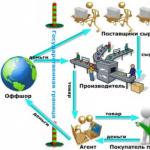(from Latin fabrica workshop), an industrial enterprise based on the use of a system of machines. From an economic point of view, there is no difference between a factory and a plant. Trade Wars - Document. The difference between a factory and a factory When did factories appear?
Homework assignments No. 6 (Lecture 6)
The first industrial revolution and the beginning of industrial entrepreneurship in the West.
Exercise 1.
Factory – (from Latin fabrica - workshop), industrial enterprise based on the use of a system of machines. From an economic point of view, there is no difference between a factory and a plant.
Trade wars – a situation in which countries participating in international trade try to reduce the amount of competitive imports through import duties, quotas and other import restrictions.
Coke – a solid residue obtained from the coking of natural fuels (mainly coal), as well as some petroleum products, for example. tar. Contains 91-99.5% carbon. Coal coke is a fuel and a reducing agent for iron ore in the production of cast iron, petroleum coke is a material for the manufacture of electrodes and corrosion-resistant equipment, a reducing agent in the production of ferroalloys, etc.
Puddling – (from puddle - mix), conversion of cast iron into low-carbon dough-like iron on a so-called hearth. puddling oven. The metal and slag were mixed and “rolled” into the kritsa. It replaced the critical redistribution (2nd half of the 18th century). With the advent of mass methods for the production of cast steel (open hearth, converter; 2nd half of the 19th century), puddling lost its industrial significance.
Luddites – participants in the first spontaneous protests against the use of machines during the industrial revolution in Great Britain (late 18th - early 19th centuries). The name comes from the legendary apprentice Ned Ludd, who was supposedly the first to destroy the machine in a reckless rage.
Chartism – (from English charter - charter), first mass labor movement in Britain in 1830-50s. The Chartists' demands were set out in the form of a bill (People's Charter, 1838). The National Chartist Association was founded in 1840. In 1840, 1842, 1848, Chartists submitted petitions to parliament demanding introducing universal suffrage (for men), limiting the working day, increasing wages and etc.; the petitions were rejected. After 1848, Chartism entered a period of decline.
Fritre(y)derstvo – (from English. free trade - free trade), direction in economic theory and politics, the basic principles of which are demand for free trade and non-intervention by the state into private enterprise. Originated in Great Britain in the last third of the 18th century.
Corn laws – in Great Britain in the 15th-19th centuries, they regulated the import and export of grain and other agricultural products (mainly through high import customs tariffs). They led to a reduction in food products on the domestic market and an increase in prices for them. They met the interests of landlords. In the 19th century the repeal of the Corn Laws became the slogan of the free traders. Abolished in 1846.
"Rochdale Pioneers" – Partnerships appear for the first time in England. The prototype was a partnership founded in 1844 in Rochdale by weavers with a capital of only 270 rubles - the Rochdale pioneers.
Sovereign – english gold coin, minted with 1489 mass of 15.47 g of pure gold; since 1816 1 Sovereign = 1 pound sterling. Since 1917, sovereigns have been issued only for sale on international gold markets.
Cobden-Chevalier Treaty – saving treaty for France with England 1860
Richard Cobden- (1804-65), one of the leaders and ideologist of free traders in Great Britain.
Michel Chevalier
Task 2.
Social groups in parliamentary parties
|
Tori |
The social composition of the first Tory party was heterogeneous. It included people from families large landowners, gentry, top clergy, lawyers, high ranks of the army, royal bureaucracy. Party core constituted the upper strata of the ruling classes - noble aristocracy . It is not surprising, therefore, that almost all members of the Tory party actively supported both the king and the restoration regime existing in the country. |
|
Whigs |
represented the interests bourgeoisie and middle nobility, opposed to the crown |
|
Conservatives (Tory) |
was the worst enemy of the working class. landed aristocracy and big merchant bourgeoisie |
|
Liberals (Whigs) |
FACTORY
FACTORY
(Latin fabrica, from faber - worker). An establishment for the manufacture of any products needed in life from raw materials; differs from a factory in that the work is carried out for the most part without the help of fire.
Dictionary of foreign words included in the Russian language. - Chudinov A.N., 1910 .
FACTORY
a more or less large industrial establishment, distinguished from a craft establishment by the use of machinery and the division of labor.
Dictionary of foreign words included in the Russian language. - Pavlenkov F., 1907 .
FACTORY
lat. fabrica. An establishment for processing raw materials in order to apply them to human needs.
Explanation of 25,000 foreign words that have come into use in the Russian language, with the meaning of their roots. - Mikhelson A.D., 1865 .
FACTORY
an industrial establishment that employs a more or less significant number of workers for production, among whom division of labor is applied; differs from a craft establishment in the large number of workers and the introduction of machinery.
A complete dictionary of foreign words that have come into use in the Russian language. - Popov M., 1907 .
Factory
(lat. fabrica workshop) an enterprise that produces predominantly. light and food industry products.
New dictionary of foreign words. - by EdwART,, 2009 .
Factory
factories, railway [ Latin fabrica, workshop]. An enterprise that primarily produces goods from the light and food industries.
Large dictionary of foreign words. - Publishing House "IDDK", 2007 .
Factory And, and. (it. fabbrica lat. fabrica workshop).
Industrial enterprise with machine production method ( advantage light and food industry goods). Tkatskaya f. Work in a factory.
Factory- relating to factory, factories.
Dream Factory (joking) - about Hollywood.
||
Wed. manufactory.
Explanatory dictionary of foreign words by L. P. Krysin. - M: Russian language, 1998 .
Synonyms:
See what "FACTORY" is in other dictionaries:
factory- factory … Nanai-Russian dictionary
Logo of the “Star Factory” project Genre music program Production TV company ViD (until 2007), Red Square ... Wikipedia
factory- and, f. fabrique f. floor. fabryka, German Fabrike; it. fabbrica lat. fabrica workshop. 1. In the first decade 18. Structure, construction and type of construction work, construction, especially church work. Exchange 143. The castle was not made by a new factory... ... Historical Dictionary of Gallicisms of the Russian Language
FACTORY, factories, women. (Latin fabrica, lit. structure). 1. An industrial enterprise that processes raw materials by machine. Paper factory. Match factory. Confectionery factory. Cloth factory. Work in a factory. 2. transfer... ... Ushakov's Explanatory Dictionary
Cm … Synonym dictionary
Female, German a working establishment, for the manufacture of something, a factory; factories are those plants where fire (heating, smelting, cooking) does not occupy the first place. Cast iron, potash plant; linen, cloth factory. Factory buildings; product. | Factory... ... Dahl's Explanatory Dictionary
An industrial enterprise based on the use of a system of machines, usually in the light, food and mining industries: textile, confectionery, sintering, processing factories, etc. In English: Factory See also: ... ... Financial Dictionary
A manufacturing enterprise engaged in the production of goods from the light and food industries. Dictionary of business terms. Akademik.ru. 2001 ... Dictionary of business terms
- (from Latin fabrica workshop) an industrial enterprise based on the use of a system of machines. From an economic point of view, there is no difference between a factory and a plant... Big Encyclopedic Dictionary
Industrial enterprise; historically in Russia the term applied primarily to enterprises in the light and food industries. Raizberg B.A., Lozovsky L.Sh., Starodubtseva E.B.. Modern economic dictionary. 2nd ed., rev. M.: INFRA M.... ... Economic dictionary
Books
- Precision Factory, K. Merkulyeva. The book by children's writer Ksenia Merkulyeva (1889-1991) The Precision Factory is a collection of essays about the House of Weights and Measures, about why “hourly precision” is needed, and what would happen if all the measures...
The article talks about what a factory is, when the first such enterprises were created and what their advantage is over manual labor.
Ancient times
At all times, people have realized the importance of crafts. After all, it is much easier to purchase or order a product than to spend months, or even years, on mastering the skills of making it. In any society, tribe or community there have always been those who were engaged in one thing, devoting, for example, most of their time to sewing boots, without being distracted by everything else. Such people were called artisans.
But with the development of society and the growth of the total population of the Earth, people began to consume much more different goods, including food. And it became very difficult to satisfy the needs of everyone with the help of small craft shops. In addition, the more expensive a particular product is, the more time and effort is spent on its production. And all this gradually led to the emergence of factories. This is a natural process, in which the development of technology and the first electronics played a large role. And, by the way, the emergence of such a production phenomenon as a factory is one of the signs of the industrial revolution in the 18th-19th centuries. But first things first.
Definition
This word comes from the Latin language and in the original it sounds like fabrica, which means “factory” or “workshop”. Now let's take a closer look at what it is.
A factory is an industrial enterprise whose work is based on the use of machines for more productive and high-quality work. Most often, a factory complex consists of several buildings, each of which deals with its own production stage or type of product. Also (but not necessarily) the factory has warehouse premises and management offices. So a factory is an industrial enterprise whose work is clearly organized. The real heyday of such enterprises occurred in the middle of the 19th century, when many manual labor processes were replaced by automatic machines.
But this term is most often used in relation to light or mining industries, for example, a furniture factory or a knitting factory. And in other areas they usually use the word “factory”. In the event that other production enterprises are united by a common territory and management, then they are called a plant. Eg,
Story

The factory is one of those manifestations of technology that has greatly influenced and changed the world. The rise of fully or partially automated production quickly replaced manufactories, enterprises where all work cycles were carried out manually.
It all started at the end of the 18th - beginning of the 19th centuries in England. And, by the way, steam engines and some other inventions of those times played a big role in factory production. The first country to almost completely transfer light industry to the factory type is England. Of course, not everything went so smoothly - there is numerous historical evidence of how often dissatisfied artisans tried to destroy weaving factories because they produced products in much larger volumes, which devalued exclusively manual labor. For example, a furniture factory could provide entire cities with inexpensive furniture, while ordinary carpenters could not boast of such productivity.
Gradually, starting from the middle of the 19th century, mechanization covered other areas of production. Powerful steam engines, mechanical hammers, milling, turning and other machines appeared, which greatly increased labor productivity in general.
Heyday

But the real heyday of such production can be called the beginning of the 20th century, when universal electrification greatly facilitated the work of enterprises such as factories. Photos from those times often show that, for example, lathes were driven by the muscular power of animals, water, or the efforts of the worker himself, which cannot be called a productive approach.

Now there are factories in all countries, and they are an important part of the industry and economy of any state. So we figured out what a factory is and what their advantages are over manufactories or purely manual labor.
Logo of the “Star Factory” project Genre music program Production TV company ViD (until 2007), Red Square ... Wikipedia
factory- and, f. fabrique f. floor. fabryka, German Fabrike; it. fabbrica lat. fabrica workshop. 1. In the first decade 18. Structure, construction and type of construction work, construction, especially church work. Exchange 143. The castle was not made by a new factory... ... Historical Dictionary of Gallicisms of the Russian Language
FACTORY, factories, women. (Latin fabrica, lit. structure). 1. An industrial enterprise that processes raw materials by machine. Paper factory. Match factory. Confectionery factory. Cloth factory. Work in a factory. 2. transfer... ... Ushakov's Explanatory Dictionary
- (Latin fabrica, from faber worker). An establishment for the manufacture of any products needed in life from raw materials; differs from a factory in that the work is carried out for the most part without the help of fire. Dictionary of foreign words included in... ... Dictionary of foreign words of the Russian language
Cm … Synonym dictionary
Female, German a working establishment, for the manufacture of something, a factory; factories are those plants where fire (heating, smelting, cooking) does not occupy the first place. Cast iron, potash plant; linen, cloth factory. Factory buildings; product. | Factory... ... Dahl's Explanatory Dictionary
An industrial enterprise based on the use of a system of machines, usually in the light, food and mining industries: textile, confectionery, sintering, processing factories, etc. In English: Factory See also: ... ... Financial Dictionary
A manufacturing enterprise engaged in the production of goods from the light and food industries. Dictionary of business terms. Akademik.ru. 2001 ... Dictionary of business terms
- (from Latin fabrica workshop) an industrial enterprise based on the use of a system of machines. From an economic point of view, there is no difference between a factory and a plant... Big Encyclopedic Dictionary
Industrial enterprise; historically in Russia the term applied primarily to enterprises in the light and food industries. Raizberg B.A., Lozovsky L.Sh., Starodubtseva E.B.. Modern economic dictionary. 2nd ed., rev. M.: INFRA M.... ... Economic dictionary
Books
- Precision Factory, K. Merkulyeva. The book by children's writer Ksenia Merkulyeva (1889-1991) The Precision Factory is a collection of essays about the House of Weights and Measures, about why “hourly precision” is needed, and what would happen if all the measures...
- Factory of magical toys. A story for children, Alexander Ber. Everyone knows that every child has his own favorite toy, but few people know where they come from. In fact, the best toys are made in his magic factory by the kind...
Human production activity in the 20th century reached a qualitatively new level, hitherto unprecedented. Plants and factories have appeared in all states that produce a huge number of consumer goods. These concepts are not just used as synonyms, but are completely identified. How important is it to differentiate between these categories?
Factory- an enterprise with an automated production cycle and a relatively large number of workers. Products are produced in mass quantities, and individual units of each of them do not have individual characteristics. The factory is a new milestone in the development of industry compared to the craft workshop, where the final division of labor took place.
Factory– an industrial facility that produces products, or an enterprise that breeds horses and other purebred animals. The most important attribute is a complete automated cycle, requiring minimal human intervention. In the literature, factories are often referred to as those facilities where means of production are produced. Deep processing of raw materials involves a minimum amount of waste.
Comparison
At first glance, it seems that the differences between these categories are purely etymological in nature. The concept of “factory” is of European origin, the concept of “plant” is Russian. But there are some other differences that allow you to better understand the essence of the categories. Thus, the plant must have its own power plant, which is involved in production. The factory does not have it, which makes it dependent on external energy sources.
During the Soviet era, factories primarily included those facilities that produced equipment, means of production, and technically complex objects. The factories included light industry enterprises with relatively shallow processing of raw materials. Factories are also called specialized farms for breeding purebred animals.
Novo-Lipetsk Metallurgical Plant
Otherwise, the differences are rather traditional in nature and practically do not reflect the essence of the object: a champagne wine factory, a bakery, a dairy, etc. Along with them, steel factories are known. At both types of production facilities, a closed cycle operates, at the start of which raw materials are consumed, and at the output, products are produced. The system is fully automated; human participation in these processes is minimal. At a factory, the production cycle is usually much deeper and longer than at a factory, but everything depends on specific examples.
Conclusions website
- Origin. The word “factory” came into our language from Latin, while the word “plant” is originally Russian.
- Mode of production. A factory can produce not only products, but also means of production, while a factory can produce consumer goods.
- Meaning. A factory is always an industrial enterprise, while the term “plant” can also mean an organization for the breeding and selection of purebred animals.
- Source of energy. The plant has its own power plant, but the factory does not have one.
- Degree of processing. Standardization is increasingly used in factories; resources are supplied both in the form of raw materials and individual parts. In factories, the production cycle is narrower and involves fewer steps.




